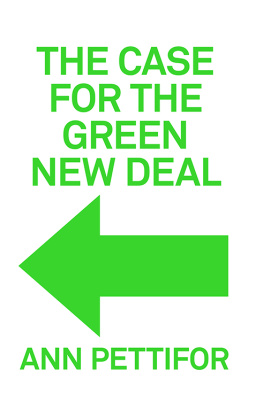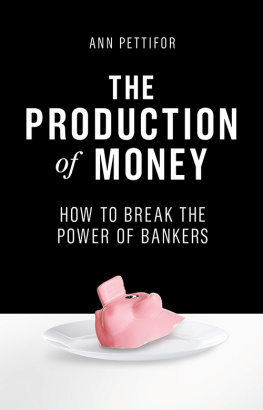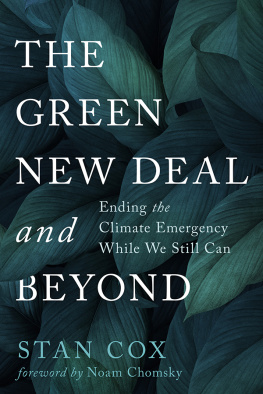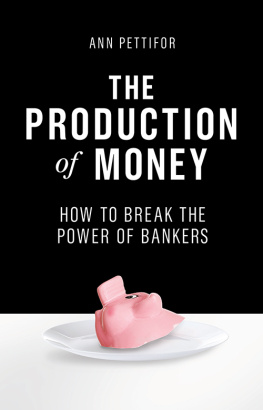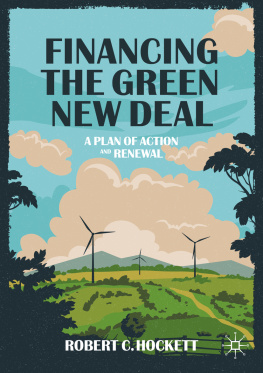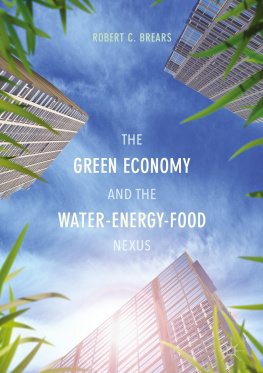Contents

The Case for the Green New Deal
The Case for the
Green New Deal
Ann Pettifor

First published by Verso 2019
Ann Pettifor 2019
All rights reserved
The moral rights of the author have been asserted
1 3 5 7 9 10 8 6 4 2
Verso
UK: 6 Meard Street, London W1F 0EG
US: 20 Jay Street, Suite 1010, Brooklyn, NY 11201
versobooks.com
Verso is the imprint of New Left Books
ISBN-13: 978-1-78873-815-6
ISBN-13: 978-1-78873-827-9 (UK EBK)
ISBN-13: 978-1-78873-828-6 (US EBK)
British Library Cataloguing in Publication Data
A catalogue record for this book is available from the British Library
Library of Congress Cataloging-in-Publication Data
A catalog record for this book is available from the Library of Congress
Typeset in Fournier MT by Hewer Text UK Ltd, Edinburgh
Printed and bound by CPI Group (UK) Ltd, Croydon CR0 4YY
I dedicate this book to my school-striking grandsons: Django and Theodore Pettifor-Carey.
The law locks up the man or woman
Who steals the goose from off the common
But leaves the greater villain loose
Who steals the common from off the goose.
The law demands that we atone
When we take things we do not own
But leaves the lords and ladies fine
Who take things that are yours and mine.
The poor and wretched dont escape
If they conspire the law to break;
This must be so but they endure
Those who conspire to make the law.
The law locks up the man or woman
Who steals the goose from off the common
And geese will still a common lack
Till they go and steal it back.
Anonymous (seventeenth century)
Contents
We can afford what we can do. This is the theme of the book in your hands. There are limits to what we can do notably ecological limits, but thanks to the public good that is the monetary system, we can, within human and ecological limits, afford what we can do.
For humanity to survive on a liveable planet there is an urgency to what we must, and can, do. We are facing extinction. The earths complex life support systems of atmosphere, oceans, land surface and life forms are at the point of breakdown, according to the worlds top scientists. As George Monbiot has warned, Only one of the many life support systems on which we depend soils, aquifers, rainfall, ice, the pattern of winds and currents, pollinators, biological abundance and diversity need fail for everything to slide.
The UNs Intergovernmental Panel on Climate Change (IPCC) issued a clear and trenchant call for action in 2018. We need to cut annual global emissions by half in the next twelve years and hit net zero carbon by the middle of the century. According to Jason Hickel in Foreign Policy magazine,
It would be difficult to overstate how dramatic this trajectory is. It requires nothing less than a total and rapid reversal of our present direction as a civilization. The challenge is staggering in its scale, and the stakes are even more so. As the co-chair of an IPCC working group put it, The next few years are probably the most important in our history. After decades of delay, this is our last chance to get it right.
For the UK and US, as well as other OECD countries, averting climate breakdown means cutting CO2 emissions by 80 per cent by 2030 and reaching a zero carbon economy by 2040. This will allow OECD emission cuts to be equitably shared with non-OECD countries emission cuts (as in the 1992 UN Convention on Climate Changes common but differentiated responsibilities (CBDR), in which OECD nations have to cut first and hardest).
To protect earths life support systems and to achieve such a radical transformation we must escape from capitalisms globalised, carbon-belching financial system designed and engineered to issue trillions of dollars of unregulated credit to fund supposedly limitless consumption, and in turn to furiously fuel toxic emissions. It is an economic system that over a relatively short period of human history has wrecked earths natural systems. And thanks to capitalisms dependence on a system enriched by imperialism, racism and sexism, it has bound all human societies to a form of slavery. And yet, some have made historically unprecedented capital gains from this system. They are the 1%.
As the Economist noted back in 2012, the wealthiest 1 per cent of Americans not only get more of the pie; they are increasingly creatures of finance. Steve Kaplan and Joshua Rauh of Northwestern University reported that investment bankers, corporate lawyers, hedge-fund and private-equity managers have displaced corporate executives at the top of the income ladder. In 2009 the richest twenty-five hedge-fund investors earned more than $25 billion, roughly six times as much as all the chief executives of companies in the S&P 500 stock index combined. And yet the financial system on which these wealthy individuals have gorged is not itself a private asset. It is instead a great public asset, financed, guaranteed and sustained by millions of ordinary taxpayers in all the economies of the world. In other words, a great public good has been captured by the 1 per cent. It needs to be restored to collective ownership.
At the same time, environmentalists have treated the ecosystem for too long as almost independent of the dominant economic system based on deregulated, globalised finance. Macroeconomics, monetary theory in particular, are deemed a subject for experts the creatures of finance that control the globalised financial system. Much of what is done within that system is deliberately kept hidden from societys gaze. Even so, many continue to avert their gaze from the activities of the finance sector, partly because the system appears too complex and remote, but also because we all benefit from it in some way. Millennials and pensioners alike enjoy the freedom that globalised finance provides for those who wish and can afford to travel widely among foreign lands and cultures. Many appreciate the ease with which bank accounts can be accessed in remote places, along with the ability to purchase and transport goods from anywhere on earth by making a bank transfer with just the click of a computer button.
I will argue that we can no longer afford to indulge such freedoms and powers, or to bend to the will of the gods of finance. There will be no chance of protecting earths life support systems if we do not simultaneously escape from the grip of the masters of the globalised financial system. A capitalist system that is blind to the most vital capital of all: that provided by nature, which finds itself exploited parasitically and used up at a reckless rate, as E. F Schumacher argued in his 1973 classic, Small Is Beautiful.
By escaping from the inexorable control of the masters of the financial universe, we will find that we can afford to create a new, more balanced system of international economic and ecological justice. That we can also afford to reforest large swathes of the earth and its coastal areas. We will discover that we can afford to urgently end the globalised economys addiction to fossil fuels. That we can afford to transform our economy away from its fixation with growth. That we can, within our own finite physical and intellectual limits, begin to restore our damaged ecosystems to health. That we can work together, collectively, to protect ourselves, our families and communities and the environments in which we survive, grow, develop and create.

